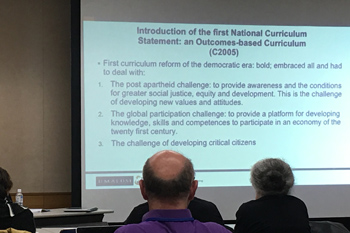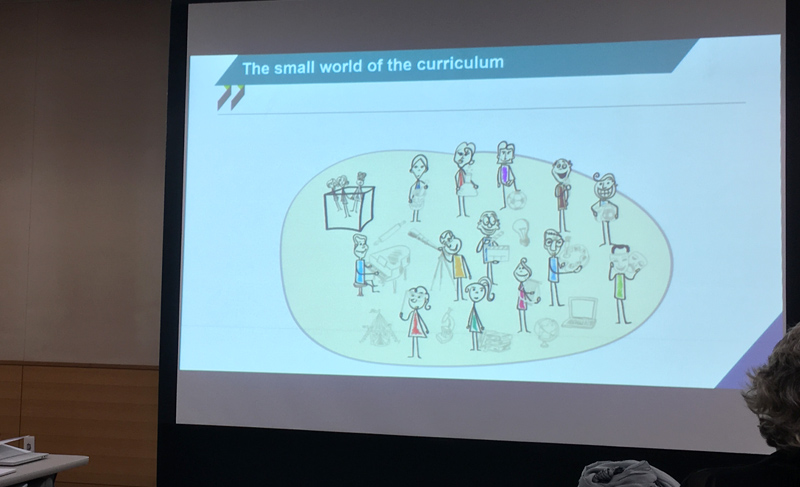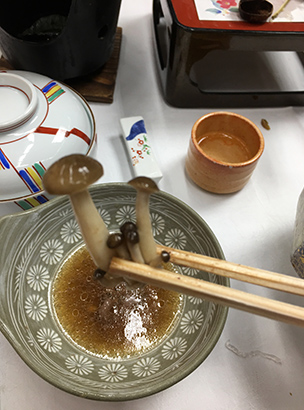“If you want to go fast, go alone. If you want to go far, go together.” – African proverb

The second day into the ICMI Study 24 Conference, I sat in a room with 96 other people from 34 countries, ready to be a small part of a unique kind of undertaking. As the room focused intently, a panellist, Dr Peter Volmnick, ended with this quotation on the screen after tracing the history of mathematics curriculum reform in post-apartheid South Africa. After a day and half of study-conferencing, we could all see what he meant, not just for the nation-sized system of curriculum reform but for our tiny microcosm of it right there. We had all gathered together for the week to discuss what should go into a book and start drafting it, and already we had arrived at both halves of the proverb: it is slower going to build and express ideas as a group, but each theme was becoming far richer and more relevant to others as we explored it together.
As a field, curriculum reform is young to nascent, multi-scalar and wildly interdisciplinary. Field or no, the process itself has been going on for a long time, and in many jurisdictions the scale continues to expand even as the pace of change accelerates. The goal for the book that ICMI Study 24 will eventually produce is to develop a clearer picture of some of the forces involved in curriculum reform – the theoretical influences, practical experiences, constraints, and aims of the people involved in curriculum reform and enactment, what they do as a result, and what the implications are for curricula and the experiences of students and teachers at classroom level.
In some ways the study conference participants felt that the relative lack of theoretical development around curriculum reform left this task categorically open-ended, but we split into five different themes for group discussions and made a start. Of these five themes, one focused on the details of past curriculum reforms, one on how to analyse the “coherence and relevance” of reforms, one on implementing reforms, one on the impacts of globalisation, and one on modelling curriculum design, development, and reform as a system of agents, processes, and the documents, institutions and practices they act on. I was in this fifth theme group, Theme E, “agents and processes”.

Speaking from my experiences in Theme E, we all found valuable the moments when, being from very different countries and contexts, we realised we were using the same words to mean quite different things, or different words to mean almost the same thing. Such moments were common at this conference but tend to be rarer in day-to-day life. Each time, it helped us to see our own contexts in a new light, as one of many possible arrangements, and to develop a picture that could be more widely applicable to others working in curriculum reform.
As the discussion moved to the point where we could propose a structure for the chapter, we started the process of drafting some of it. Not only could I see how our work at Cambridge Mathematics is connected to projects in other parts of the world, I could see how the questions others were addressing could provide invaluable perspectives to inform our work. The atmosphere in the group was one of excitement as over the course of the week we built a sense of an ongoing community, developing connections for the future, where we will continue to be in touch for writing but also to keep providing for each other this expanded perspective that helps research to build in a meaningful way.

If I haven’t written much about Japan in this post yet, it’s because our experience of the place where the conference was held layered into the overall experience gradually – a consequence of a full discussion schedule and gradual release from the grip of jet lag. The conference hosts were extremely hospitable, and midway through the week we were also very kindly hosted as visitors to a nearby school. There we could see in action how the sense of meaningful contribution to the community was designed into school life in Japan, for teachers and students, and we saw many examples of the influence of this education everywhere throughout our stay. Again, I had the experience of seeing a wider principle applied to the microcosm of the study conference, as we spent the week coming to understand and trust in the contributions that come from the different roles and backgrounds that we all have. Theme E’s dinner at an izakaya restaurant, where we all added ingredients to a shared pot, was itself a microcosm of the microcosm that we all enjoyed very much (I said it was multi-scalar!).
With everything that we experienced, observed, and discussed that week, we began to see more precisely how we could go far together – not just us as participants of one conference but as everyone being part of the process of mathematics curriculum reform. I’m looking forward to doing some writing!
Join the conversation: You can tweet us @CambridgeMaths or comment below.